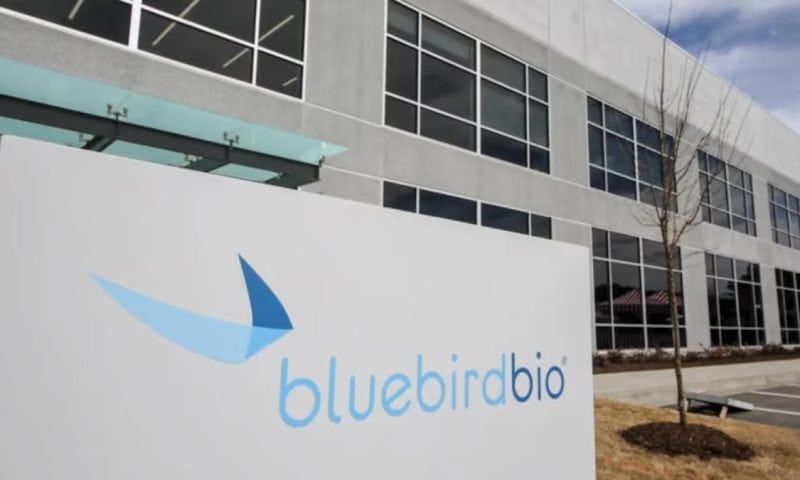bluebird bio (NASDAQ:BLUE – Free Report) had its price objective lifted by Barclays from $2.00 to $40.00 in a report issued on Tuesday,Benzinga reports. The brokerage currently has an overweight rating on the biotechnology company’s stock.
Other equities research analysts have also issued research reports about the stock. JPMorgan Chase & Co. lowered shares of bluebird bio from a “neutral” rating to an “underweight” rating in a research note on Friday, November 15th. Wells Fargo & Company cut their price objective on bluebird bio from $60.00 to $40.00 and set an “equal weight” rating on the stock in a research report on Wednesday, September 25th. Royal Bank of Canada reissued a “sector perform” rating and issued a $80.00 target price on shares of bluebird bio in a research report on Friday, November 15th. StockNews.com assumed coverage on bluebird bio in a research report on Friday, December 20th. They set a “sell” rating on the stock. Finally, Bank of America downgraded bluebird bio from a “buy” rating to a “neutral” rating and decreased their price objective for the stock from $60.00 to $10.00 in a report on Friday, November 15th. Three research analysts have rated the stock with a sell rating, six have assigned a hold rating and two have assigned a buy rating to the company. According to MarketBeat.com, the company has an average rating of “Hold” and a consensus target price of $49.14.
bluebird bio Trading Up 6.1 %
Shares of bluebird bio stock traded up $0.48 during trading on Tuesday, reaching $8.34. 407,552 shares of the stock were exchanged, compared to its average volume of 396,845. bluebird bio has a 1 year low of $5.80 and a 1 year high of $38.40. The firm has a market cap of $81.08 million, a price-to-earnings ratio of -4.46 and a beta of 0.72. The company has a quick ratio of 0.33, a current ratio of 0.51 and a debt-to-equity ratio of 0.37. The stock’s fifty day moving average is $8.33 and its 200 day moving average is $13.14.
bluebird bio (NASDAQ:BLUE – Get Free Report) last issued its quarterly earnings data on Friday, September 27th. The biotechnology company reported ($8.40) earnings per share for the quarter, missing analysts’ consensus estimates of ($8.00) by ($0.40). bluebird bio had a negative return on equity of 322.46% and a negative net margin of 565.74%. The business had revenue of $16.10 million during the quarter, compared to the consensus estimate of $16.09 million. As a group, equities research analysts expect that bluebird bio will post -1.35 earnings per share for the current fiscal year.
Institutional Investors Weigh In On bluebird bio
Several institutional investors and hedge funds have recently made changes to their positions in the company. Allegheny Financial Group LTD purchased a new stake in bluebird bio during the 2nd quarter valued at $25,000. State Street Corp lifted its holdings in shares of bluebird bio by 1.1% during the third quarter. State Street Corp now owns 3,841,923 shares of the biotechnology company’s stock valued at $1,996,000 after purchasing an additional 43,382 shares in the last quarter. Rhumbline Advisers boosted its position in shares of bluebird bio by 25.4% during the second quarter. Rhumbline Advisers now owns 292,436 shares of the biotechnology company’s stock valued at $288,000 after buying an additional 59,219 shares during the last quarter. SG Americas Securities LLC increased its holdings in bluebird bio by 152.4% in the 3rd quarter. SG Americas Securities LLC now owns 122,855 shares of the biotechnology company’s stock worth $64,000 after buying an additional 74,185 shares in the last quarter. Finally, Captrust Financial Advisors raised its position in bluebird bio by 48.2% in the 3rd quarter. Captrust Financial Advisors now owns 237,648 shares of the biotechnology company’s stock worth $123,000 after buying an additional 77,293 shares during the last quarter. Institutional investors own 87.43% of the company’s stock.
About bluebird bio
bluebird bio, Inc, a biotechnology company, researches, develops, and commercializes gene therapies for severe genetic diseases. Its product candidates for severe genetic diseases include ZYNTEGLO (betibeglogene autotemcel) for the treatment of transfusion-dependent ß-thalassemia; lovotibeglogene autotemcel for the treatment of sickle cell disease (SCD); and SKYSONA (elivaldogene autotemcel) to treat cerebral adrenoleukodystrophy.

